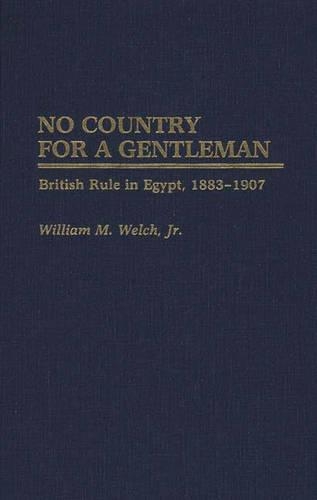
No Country For A Gentleman: British Rule in Egypt, 1883-1907
(Hardback)
Publishing Details
No Country For A Gentleman: British Rule in Egypt, 1883-1907
By (Author) William M. Welch
Bloomsbury Publishing PLC
Praeger Publishers Inc
16th August 1988
United States
Classifications
Tertiary Education
Non Fiction
962.04
Physical Properties
Hardback
182
Width 156mm, Height 235mm
510g
Description
Welch discusses the special difficulties of ruling Egypt, such as the anomalous administration, foreign interference, and national dissent, as well as the men who ruled and their perceptions of those they governed. Despite the many complexities that defined the scope of their work, British officials were able to accomplish a great deal during Cromer's tenure, a tenure which began by announcing its end and ended by proclaiming a new beginning. The many aspects of this crucial period in Anglo-Egyptian history are considered in the light of the long-term objectives of Cromer and his men, the nationalist response, and the general decline that occured toward the end of his tenure when the occupation was nearly complete. By the time of Cromer's departure, new circumstances cast a long shadow across the future of the occupation and threatened to undermine the achievements of Anglo-Egyptians.
Reviews
A well-written study of British administrative officials in Egypt, from the occupation in 1882 to the resignation in 1907 of Evelyn Baring, the Lord of Cromer, who had supervised the Egyptian government as British Consul. Welch (formerly of the American University in Cairo) stresses the evolution of how Egyptians were perceived by these officials. He also emphasizes the growth in understanding of their own role in Egypt, a territory in which they were supposed to merely correct the disorder that had resulted in British occupation. British officials soon came to persuade themselves they had a genuine mission to stay for an indefinite time.-Choice
"A well-written study of British administrative officials in Egypt, from the occupation in 1882 to the resignation in 1907 of Evelyn Baring, the Lord of Cromer, who had supervised the Egyptian government as British Consul. Welch (formerly of the American University in Cairo) stresses the evolution of how Egyptians were perceived by these officials. He also emphasizes the growth in understanding of their own role in Egypt, a territory in which they were supposed to merely correct the disorder that had resulted in British occupation. British officials soon came to persuade themselves they had a genuine mission to stay for an indefinite time."-Choice
Author Bio
WILLIAM M. WELCH, JR., is Associate Professor of Modern History at Troy State University, Alabama.
